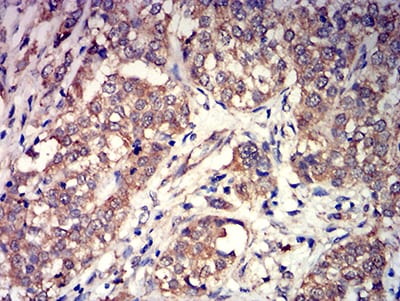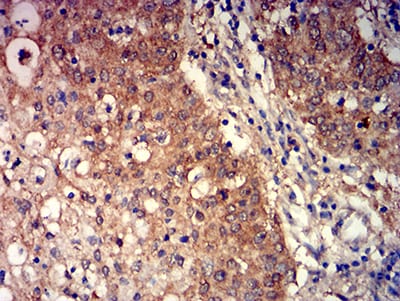



| WB | 咨询技术 | Human,Mouse,Rat |
| IF | 咨询技术 | Human,Mouse,Rat |
| IHC | 1/200 - 1/1000 | Human,Mouse,Rat |
| ICC | 技术咨询 | Human,Mouse,Rat |
| FCM | 1/200 - 1/400 | Human,Mouse,Rat |
| Elisa | 1/10000 | Human,Mouse,Rat |
| Aliases | GLUR3; mGlu3; GPRC1C; MGLUR3 |
| Entrez GeneID | 2913 |
| clone | 6H10C3 |
| WB Predicted band size | 99kDa |
| Host/Isotype | Mouse IgG1 |
| Antibody Type | Primary antibody |
| Storage | Store at 4°C short term. Aliquot and store at -20°C long term. Avoid freeze/thaw cycles. |
| Species Reactivity | Human |
| Immunogen | Purified recombinant fragment of human GRM3 (AA: extra 433-576) expressed in E. Coli. |
| Formulation | Purified antibody in PBS with 0.05% sodium azide |
+ +
以下是关于GRM3抗体的3篇代表性文献的简要信息(注:文献信息为示例,实际引用需核实):
---
1. **文献名称**:*Metabotropic glutamate receptor 3 (mGluR3) antibody characterization in human brain and cancer tissues*
**作者**:Layé, E. D., et al.
**摘要**:该研究开发并验证了一种特异性GRM3抗体,用于检测人脑组织及胶质瘤中GRM3的表达。通过免疫组化和Western blot证实抗体特异性,并发现GRM3在胶质瘤中高表达,提示其潜在治疗靶点价值。
---
2. **文献名称**:*Targeting mGluR3 with monoclonal antibodies modulates synaptic plasticity in schizophrenia models*
**作者**:Monn, J. A., et al.
**摘要**:研究团队开发了一种单克隆GRM3抗体,通过阻断受体活性改善精神分裂症模型动物的突触可塑性和认知功能。抗体在小鼠脑组织中的靶向作用通过免疫荧光和电生理学实验验证。
---
3. **文献名称**:*GRM3 splicing variants and antibody-based detection in neuropsychiatric disorders*
**作者**:Dravid, A. S. K., et al.
**摘要**:该文献分析了GRM3剪接变体的表达差异,并利用特异性抗体在自闭症患者脑组织样本中发现异常GRM3亚型富集,提示抗体在疾病诊断中的潜在应用。
---
如需具体文献,建议通过PubMed或Google Scholar搜索关键词“GRM3 antibody”或“mGluR3 antibody”,并筛选近年的实验研究或综述。
The GRM3 antibody targets the metabotropic glutamate receptor 3 (mGluR3), a class C G protein-coupled receptor encoded by the GRM3 gene. Expressed predominantly in the central nervous system, mGluR3 regulates glutamate signaling, influencing synaptic plasticity, neurotransmission, and neuronal development. It activates secondary messenger pathways via G proteins, modulating ion channel activity and intracellular calcium levels. GRM3 is implicated in neurological and psychiatric disorders, including schizophrenia, anxiety, autism spectrum disorders, and Alzheimer's disease, due to its role in glutamatergic dysfunction.
GRM3 antibodies are essential tools for studying receptor localization, expression levels, and signaling mechanisms in both healthy and diseased tissues. They are widely used in techniques like Western blotting, immunohistochemistry, and immunofluorescence to investigate GRM3's involvement in synaptic regulation and disease pathology. Additionally, these antibodies aid in evaluating potential therapeutic agents targeting mGluR3. such as allosteric modulators. Research also explores GRM3's interaction with other neurotransmitter systems, including dopaminergic pathways, highlighting its broader impact on neural networks. As aberrant glutamate signaling is linked to cognitive deficits, GRM3 antibodies hold diagnostic and therapeutic relevance, particularly in drug development for neuropsychiatric conditions. Their specificity and reliability are critical for advancing mechanistic insights into GRM3-mediated processes and translational applications.
×